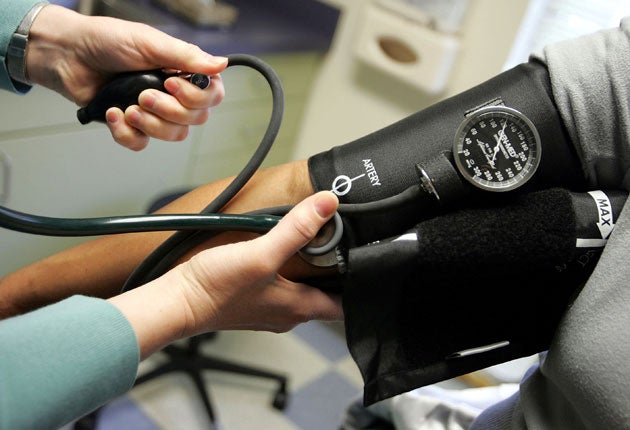Nearly 250,000 patients to be able to test blood pressure at home with free NHS monitors
At least 65,000 people have already received their blood pressure monitors

Your support helps us to tell the story
From reproductive rights to climate change to Big Tech, The Independent is on the ground when the story is developing. Whether it's investigating the financials of Elon Musk's pro-Trump PAC or producing our latest documentary, 'The A Word', which shines a light on the American women fighting for reproductive rights, we know how important it is to parse out the facts from the messaging.
At such a critical moment in US history, we need reporters on the ground. Your donation allows us to keep sending journalists to speak to both sides of the story.
The Independent is trusted by Americans across the entire political spectrum. And unlike many other quality news outlets, we choose not to lock Americans out of our reporting and analysis with paywalls. We believe quality journalism should be available to everyone, paid for by those who can afford it.
Your support makes all the difference.Nearly a quarter of a million people will be able to check their blood pressure themselves with “lifesaving” NHS monitors being delivered to their homes.
The devices are being made available to 220,000 people who have been diagnosed with uncontrolled high blood pressure, also known as hypertension, and could benefit from regular checks.
The NHS has already sent blood pressure monitors, similar to those used by doctors, to more than 65,000 people.
Recipients of the monitors are asked to measure their blood pressure and send the readings to their GP for review by telephone, email, or a dedicated website.
The aim of the scheme is to prevent thousands of cases of potentially-fatal diseases over five years as part of the NHS Long Term Plan.
Overall, the long-term plan intends to prevent about 150,000 cases of illnesses including heart attacks, strokes, kidney disease, and vascular dementia over the next decade.
High blood pressure can increase the risk of these types of diseases because the condition puts strain on the organs.
Around a third of adults in the UK have high blood pressure, although many will not realise it unless tested, the NHS says on its website.
It is advised that adults over 40 have their blood pressure checked at least once every five years. From last month, NHS pharmacies in England have been offering tests to people in this age group.
Dr Nikki Kanani, GP and national medical director of primary care for the NHS said: “It’s vital that people with high blood pressure keep track of their levels, so they can report any significant changes that could indicate a potentially deadly stroke or heart attack.
“This simple but lifesaving innovation offers people efficient and convenient care.
“By using these monitors, and reporting the readings to local teams, patients are able to quickly and easily update GP teams with a regular snapshot of their blood pressure health. These simple checks will help us to save lives.”
Dr Shahed Ahmad, national clinical director for cardiovascular disease prevention, said: “Getting these monitors into the homes of patients that need them is a really important step.
“We want people to feel empowered to monitor their own health and to understand their own conditions better. With thousands of monitors already being sent around the country, this initiative will provide GPs with more data than ever to deliver first-rate care.”
Dr Sonya Babu-Narayan, associate medical director at the British Heart Foundation (BHF) and consultant cardiologist, said that uncontrolled high blood pressure can lead to an increased risk of heart attack or stroke.
She also said: “This important initiative, supported by the BHF, means people with heart conditions can monitor their blood pressure themselves at home which reduces the need to travel for consultations.”
Health secretary Sajid Javid said the scheme is “just one way” that the government is “backing the health service to harness the potential of new technology, to support hardworking staff and save thousands of lives”.
Some blood pressure monitors – that have been approved by the NHS – are available to buy for about £20.
Patients are advised to take blood pressure tests at least twice before submitting their results for an accurate reading.
Blood pressure can be considered high if someone aged under 80 has a reading above 140/90mmHg, or if someone aged 80 and over gets a reading of 150/90mmHg.
The NHS says that people might be at higher risk of having hypertension if they are overweight, eating too much salt and not eat enough fruit and vegetables, not taking enough exercise, consuming too much caffeine, and smoking.
Other aggrevating factors include not getting enough sleep, being aged over 65, having a family history of the condition, being of black African or black Caribbean descent, and living in a “deprived area” – the NHS adds.
More information about the blood pressure test and home blood pressure monitoring can be found on the NHS England website.





Join our commenting forum
Join thought-provoking conversations, follow other Independent readers and see their replies
Comments